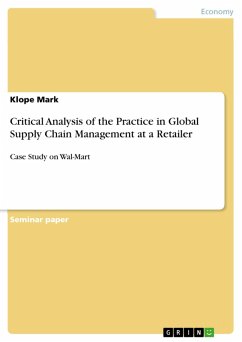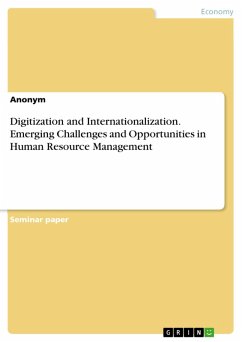
The Uppsala model of internationalization. A critical review (eBook, PDF)
Versandkostenfrei!
Sofort per Download lieferbar
Statt: 17,95 €**
15,99 €
inkl. MwSt. und vom Verlag festgesetzt.
**Preis der gedruckten Ausgabe (Broschiertes Buch)
Alle Infos zum eBook verschenkenWeitere Ausgaben:

PAYBACK Punkte
0 °P sammeln!
Seminar paper from the year 2014 in the subject Business economics - Business Management, Corporate Governance, grade: 1,7, University of Applied Sciences Essen, language: English, abstract: This term paper deals with the Uppsala model of internationalization and the question whether it is still working today or if modern companies have more possibilities to enter new markets in foreign countries in a different way. The model was developed almost forty years ago and the framework and conditions of internationalization and technological progress have changed a lot. In economics, internationaliz...
Seminar paper from the year 2014 in the subject Business economics - Business Management, Corporate Governance, grade: 1,7, University of Applied Sciences Essen, language: English, abstract: This term paper deals with the Uppsala model of internationalization and the question whether it is still working today or if modern companies have more possibilities to enter new markets in foreign countries in a different way. The model was developed almost forty years ago and the framework and conditions of internationalization and technological progress have changed a lot. In economics, internationalization is the process of increasing involvement of enterprises in international markets, although there is no agreed definition of internationalization. There are several internationalization theories which try to explain why there are international activities. This paper will stick to the classic school theory, the Uppsala model or international stage model in comparison to modern ways of internationalization by the example of ¿Born Globals'. The Uppsala model provides a universal explanation of how internationalization works in the form of sequential stages during its early development. ¿Born Globals' are young companies that start to globalize very fast from the beginning without any preceding long term period of internationalization. They do not follow the stages in the suggested order, they rather leap-frog some of the steps given by the model. The aim is to show that the business world has changed and the model is not contemporary anymore. This paper will start with the backround of the Uppsala model, its structure. A description of the establishment chain and the psychic chain will follow. After that the internationalization model will be illustrated which will lead to the critical view of the Uppsala model. Chapter three describes the modern way of internationalization using the example of ¿Born Globals'. The last chapter of this term paper is the conclusion.
Dieser Download kann aus rechtlichen Gründen nur mit Rechnungsadresse in A, B, BG, CY, CZ, D, DK, EW, E, FIN, F, GR, HR, H, IRL, I, LT, L, LR, M, NL, PL, P, R, S, SLO, SK ausgeliefert werden.













